2021-2022学年牛津版英语七年级上学期Unit3-Unit4重点知识练习 (含部分答案)
文档属性
| 名称 | 2021-2022学年牛津版英语七年级上学期Unit3-Unit4重点知识练习 (含部分答案) | 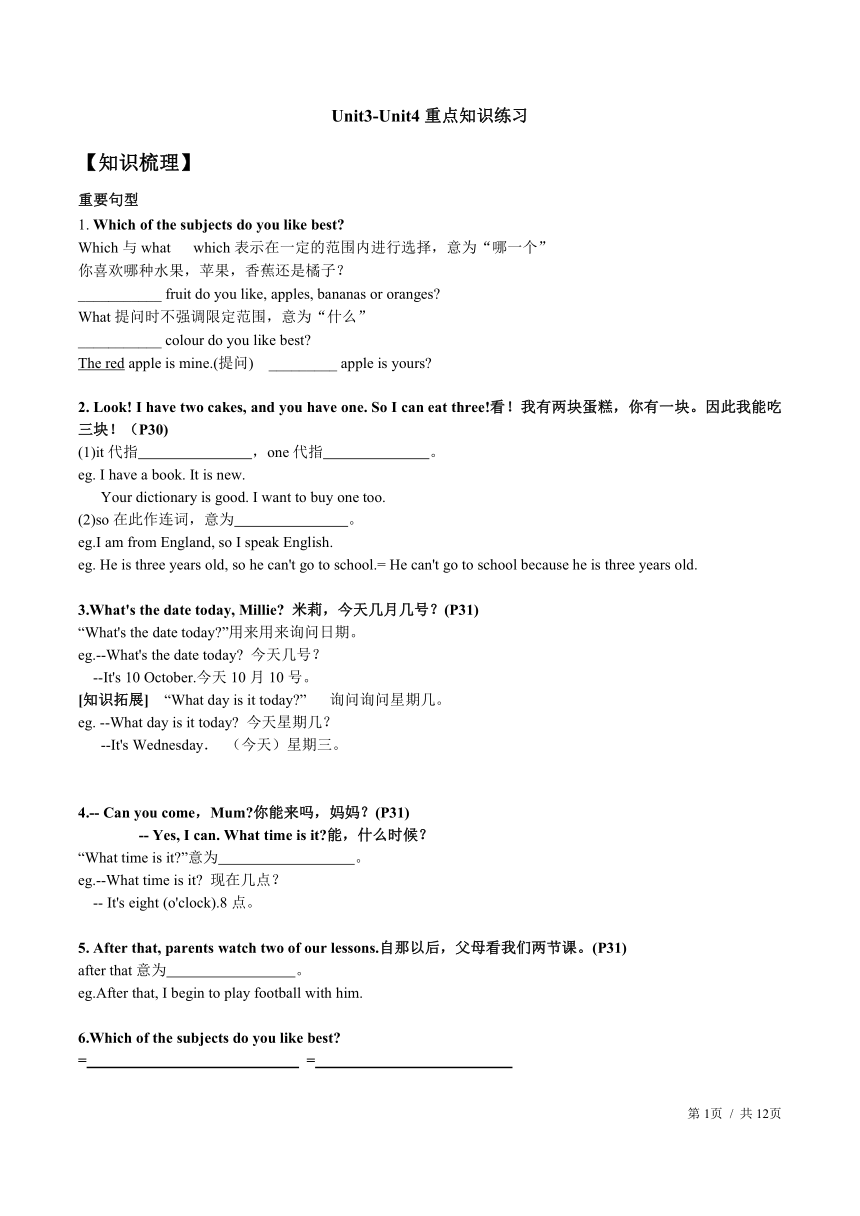 | |
| 格式 | zip | ||
| 文件大小 | 507.6KB | ||
| 资源类型 | 教案 | ||
| 版本资源 | 牛津译林版 | ||
| 科目 | 英语 | ||
| 更新时间 | 2021-08-11 10:47:25 | ||
图片预览

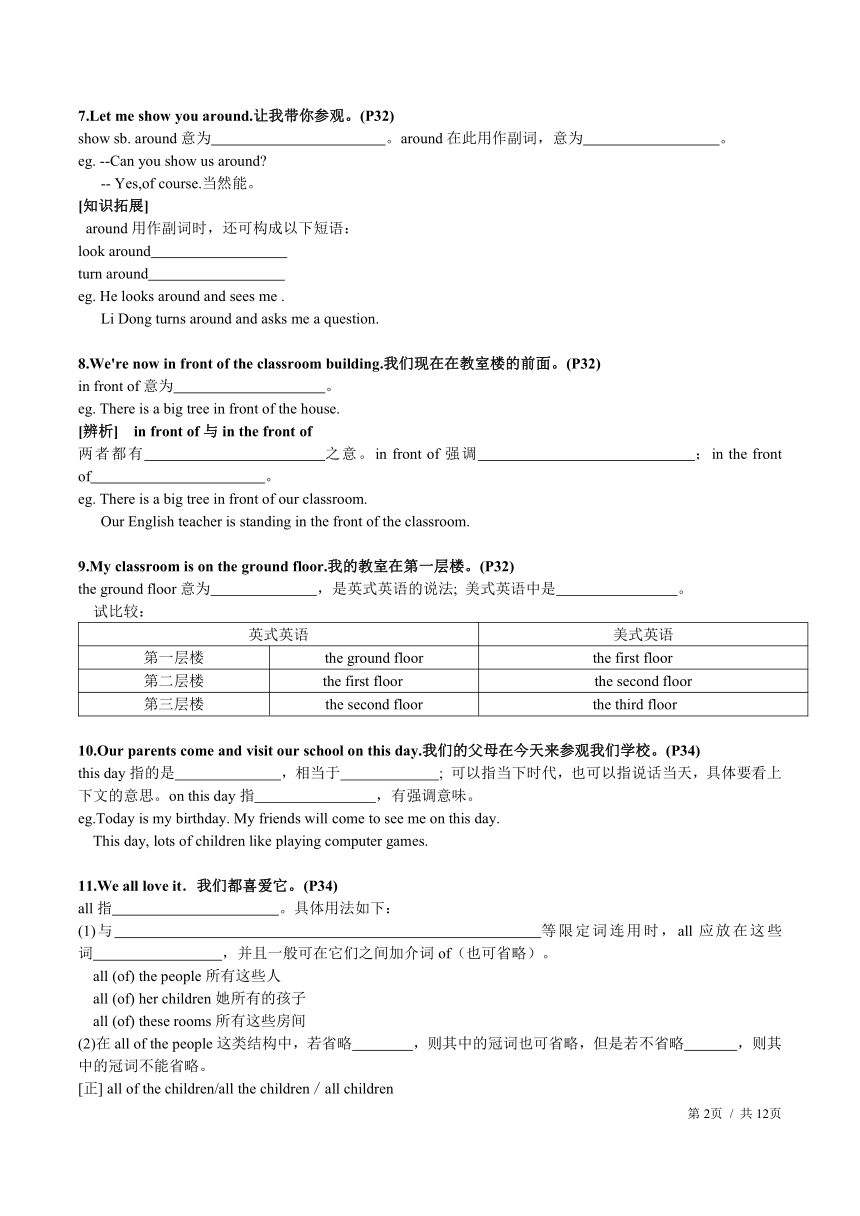
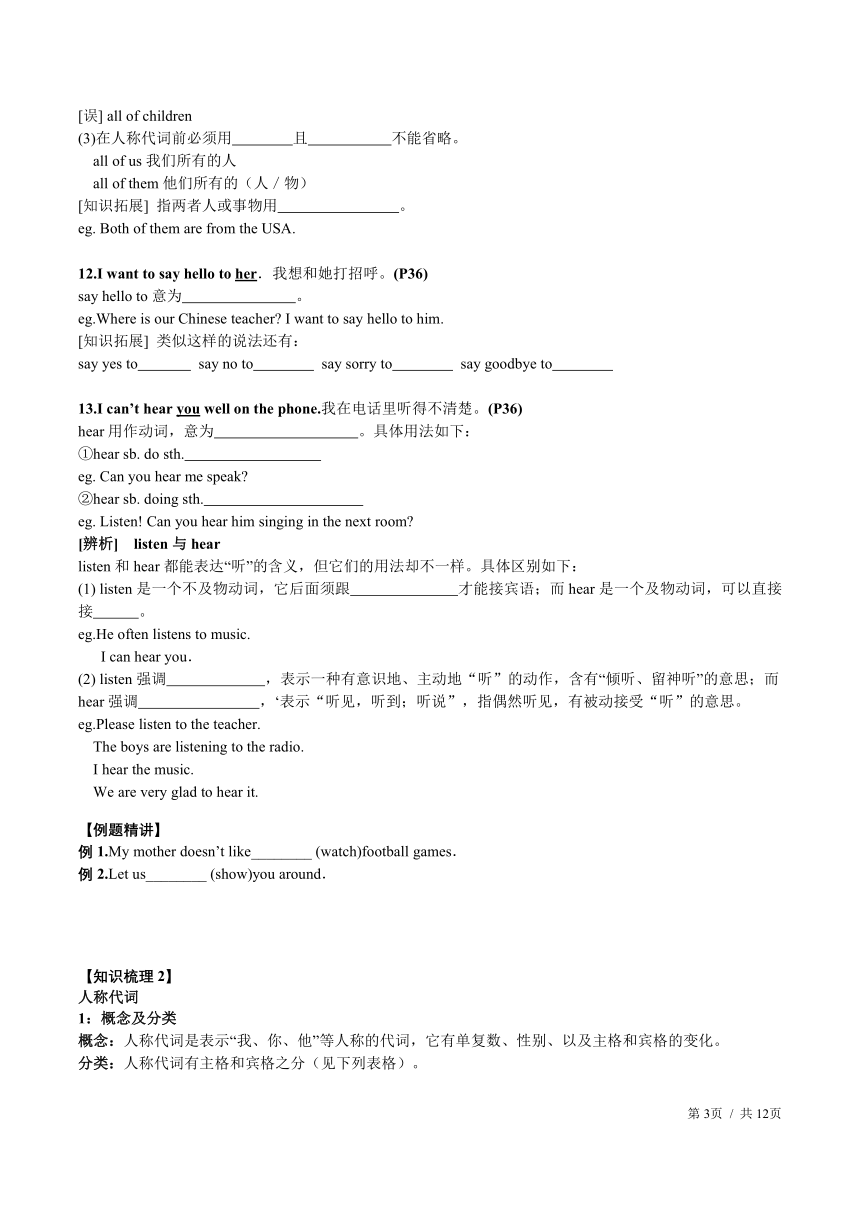
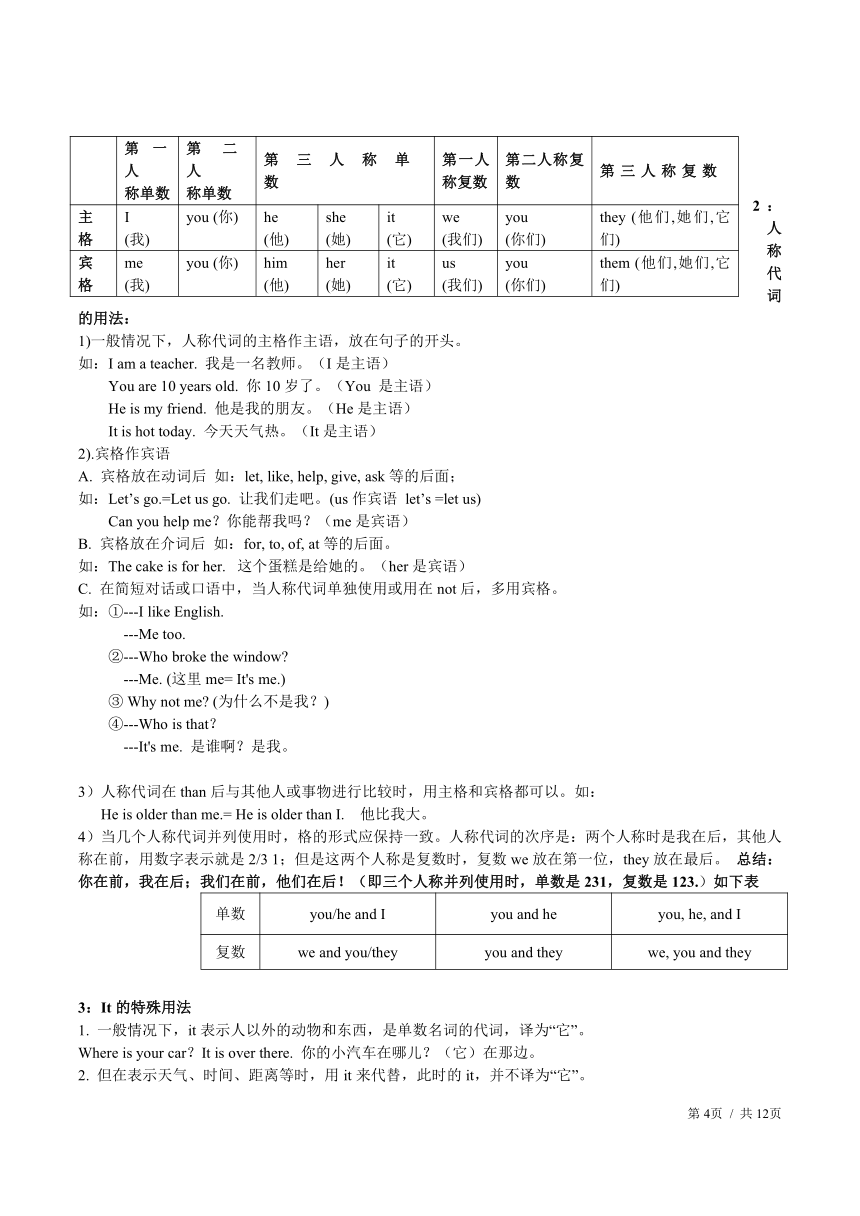
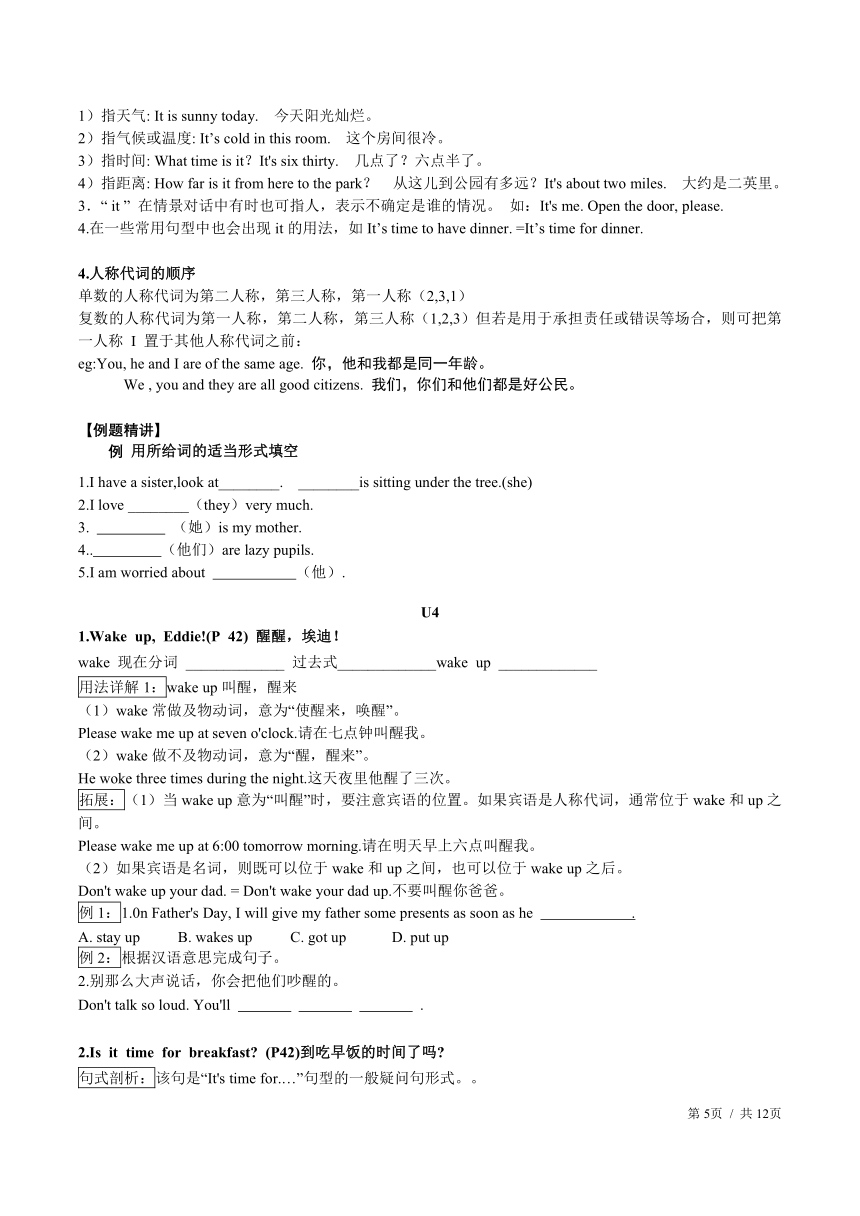
文档简介
Unit3-Unit4重点知识练习
【知识梳理】
重要句型
1.
Which
of
the
subjects
do
you
like
best?
Which与what
which表示在一定的范围内进行选择,意为“哪一个”
你喜欢哪种水果,苹果,香蕉还是橘子?
___________
fruit
do
you
like,
apples,
bananas
or
oranges?
What提问时不强调限定范围,意为“什么”
___________
colour
do
you
like
best?
The
red
apple
is
mine.(提问)
_________
apple
is
yours?
2.
Look!
I
have
two
cakes,
and
you
have
one.
So
I
can
eat
three!看!我有两块蛋糕,你有一块。因此我能吃三块!(P30)
(1)it代指
,one代指
。
eg.
I
have
a
book.
It
is
new.
Your
dictionary
is
good.
I
want
to
buy
one
too.
(2)so在此作连词,意为
。
eg.I
am
from
England,
so
I
speak
English.
eg.
He
is
three
years
old,
so
he
can't
go
to
school.=
He
can't
go
to
school
because
he
is
three
years
old.
3.What's
the
date
today,
Millie?
米莉,今天几月几号?(P31)
“What's
the
date
today?”用来用来询问日期。
eg.--What's
the
date
today?
今天几号?
--It's
10
October.今天10月10号。
[知识拓展]
“What
day
is
it
today?”
询问询问星期几。
eg.
--What
day
is
it
today?
今天星期几?
--It's
Wednesday.
(今天)星期三。
4.--
Can
you
come,Mum?你能来吗,妈妈?(P31)
--
Yes,
I
can.
What
time
is
it?能,什么时候?
“What
time
is
it?”意为
。
eg.--What
time
is
it?
现在几点?
--
It's
eight
(o'clock).8点。
5.
After
that,
parents
watch
two
of
our
lessons.自那以后,父母看我们两节课。(P31)
after
that意为
。
eg.After
that,
I
begin
to
play
football
with
him.
6.Which
of
the
subjects
do
you
like
best?
=
=
7.Let
me
show
you
around.让我带你参观。(P32)
show
sb.
around意为
。around在此用作副词,意为
。
eg.
--Can
you
show
us
around?
--
Yes,of
course.当然能。
[知识拓展]
around用作副词时,还可构成以下短语:
look
around
turn
around
eg.
He
looks
around
and
sees
me
.
Li
Dong
turns
around
and
asks
me
a
question.
8.We're
now
in
front
of
the
classroom
building.我们现在在教室楼的前面。(P32)
in
front
of意为
。
eg.
There
is
a
big
tree
in
front
of
the
house.
[辨析]
in
front
of与in
the
front
of
两者都有
之意。in
front
of强调
;in
the
front
of
。
eg.
There
is
a
big
tree
in
front
of
our
classroom.
Our
English
teacher
is
standing
in
the
front
of
the
classroom.
9.My
classroom
is
on
the
ground
floor.我的教室在第一层楼。(P32)
the
ground
floor意为
,是英式英语的说法;
美式英语中是
。
试比较:
英式英语
美式英语
第一层楼
the
ground
floor
the
first
floor
第二层楼
the
first
floor
the
second
floor
第三层楼
the
second
floor
the
third
floor
10.Our
parents
come
and
visit
our
school
on
this
day.我们的父母在今天来参观我们学校。(P34)
this
day指的是
,相当于
;
可以指当下时代,也可以指说话当天,具体要看上下文的意思。on
this
day指
,有强调意味。
eg.Today
is
my
birthday.
My
friends
will
come
to
see
me
on
this
day.
This
day,
lots
of
children
like
playing
computer
games.
11.We
all
love
it.我们都喜爱它。(P34)
all指
。具体用法如下:
(1)与
等限定词连用时,all应放在这些词
,并且一般可在它们之间加介词of(也可省略)。
all
(of)
the
people所有这些人
all
(of)
her
children她所有的孩子
all
(of)
these
rooms所有这些房间
(2)在all
of
the
people这类结构中,若省略
,则其中的冠词也可省略,但是若不省略
,则其中的冠词不能省略。
[正]
all
of
the
children/all
the
children/all
children
[误]
all
of
children
(3)在人称代词前必须用
且
不能省略。
all
of
us我们所有的人
all
of
them他们所有的(人/物)
[知识拓展]
指两者人或事物用
。
eg.
Both
of
them
are
from
the
USA.
12.I
want
to
say
hello
to
her.我想和她打招呼。(P36)
say
hello
to意为
。
eg.Where
is
our
Chinese
teacher?
I
want
to
say
hello
to
him.
[知识拓展]
类似这样的说法还有:
say
yes
to
say
no
to
say
sorry
to
say
goodbye
to
13.I
can’t
hear
you
well
on
the
phone.我在电话里听得不清楚。(P36)
hear用作动词,意为
。具体用法如下:
①hear
sb.
do
sth.
eg.
Can
you
hear
me
speak?
②hear
sb.
doing
sth.
eg.
Listen!
Can
you
hear
him
singing
in
the
next
room?
[辨析]
listen与hear
listen和hear都能表达“听”的含义,但它们的用法却不一样。具体区别如下:
(1)
listen是一个不及物动词,它后面须跟
才能接宾语;而hear是一个及物动词,可以直接接
。
eg.He
often
listens
to
music.
I
can
hear
you.
(2)
listen强调
,表示一种有意识地、主动地“听”的动作,含有“倾听、留神听”的意思;而hear强调
,‘表示“听见,听到;听说”,指偶然听见,有被动接受“听”的意思。
eg.Please
listen
to
the
teacher.
The
boys
are
listening
to
the
radio.
I
hear
the
music.
We
are
very
glad
to
hear
it.
【例题精讲】
例1.My
mother
doesn’t
like________
(watch)football
games.
例2.Let
us________
(show)you
around.
【知识梳理2】
人称代词
1:概念及分类
概念:人称代词是表示“我、你、他”等人称的代词,它有单复数、性别、以及主格和宾格的变化。
分类:人称代词有主格和宾格之分(见下列表格)。
第一人
称单数
第二人
称单数
第三人称单数
第一人称复数
第二人称复数
第三人称复数
主
格
I
(我)
you
(你)
he
(他)
she
(她)
it
(它)
we
(我们)
you
(你们)
they
(他们,她们,它们)
宾
格
me
(我)
you
(你)
him
(他)
her
(她)
it
(它)
us
(我们)
you
(你们)
them
(他们,她们,它们)
2:人称代词的用法:
1)一般情况下,人称代词的主格作主语,放在句子的开头。
如:I
am
a
teacher.
我是一名教师。(I是主语)
You
are
10
years
old.
你10岁了。(You
是主语)
He
is
my
friend.
他是我的朋友。(He是主语)
It
is
hot
today.
今天天气热。(It是主语)
2).宾格作宾语
A.
宾格放在动词后
如:let,
like,
help,
give,
ask等的后面;
如:Let’s
go.=Let
us
go.
让我们走吧。(us作宾语
let’s
=let
us)
Can
you
help
me?你能帮我吗?(me是宾语)
B.
宾格放在介词后
如:for,
to,
of,
at等的后面。
如:The
cake
is
for
her.???这个蛋糕是给她的。(her是宾语)
C.
在简短对话或口语中,当人称代词单独使用或用在not后,多用宾格。
如:①---I
like
English.
---Me
too.
②---Who
broke
the
window?
---Me.
(这里me=
It's
me.)
③
Why
not
me?
(为什么不是我?)
④---Who
is
that?
---It's
me.
是谁啊?是我。
3)人称代词在than后与其他人或事物进行比较时,用主格和宾格都可以。如:
He
is
older
than
me.=
He
is
older
than
I.
他比我大。
4)当几个人称代词并列使用时,格的形式应保持一致。人称代词的次序是:两个人称时是我在后,其他人称在前,用数字表示就是2/3
1;但是这两个人称是复数时,复数we放在第一位,they放在最后。
总结:你在前,我在后;我们在前,他们在后!(即三个人称并列使用时,单数是231,复数是123.)如下表
单数
you/he
and
I
you
and
he
you,
he,
and
I
复数
we
and
you/they
you
and
they
we,
you
and
they
3:It的特殊用法
1.
一般情况下,it表示人以外的动物和东西,是单数名词的代词,译为“它”。
Where
is
your
car?It
is
over
there.
你的小汽车在哪儿?(它)在那边。
2.
但在表示天气、时间、距离等时,用it来代替,此时的it,并不译为“它”。
1)指天气:
It
is
sunny
today.
今天阳光灿烂。
2)指气候或温度:
It’s
cold
in
this
room.
这个房间很冷。
3)指时间:
What
time
is
it?It's
six
thirty.
几点了?六点半了。
4)指距离:
How
far
is
it
from
here
to
the
park?
从这儿到公园有多远?It's
about
two
miles.
大约是二英里。
3.“
it
”
在情景对话中有时也可指人,表示不确定是谁的情况。
如:It's
me.
Open
the
door,
please.
4.在一些常用句型中也会出现it的用法,如It’s
time
to
have
dinner.
=It’s
time
for
dinner.
4.人称代词的顺序
单数的人称代词为第二人称,第三人称,第一人称(2,3,1)
复数的人称代词为第一人称,第二人称,第三人称(1,2,3)但若是用于承担责任或错误等场合,则可把第一人称
I
置于其他人称代词之前:
eg:You,
he
and
I
are
of
the
same
age.
你,他和我都是同一年龄。
We
,
you
and
they
are
all
good
citizens.
我们,你们和他们都是好公民。
【例题精讲】
例
用所给词的适当形式填空
1.I
have
a
sister,look
at________.
________is
sitting
under
the
tree.(she)
2.I?love?________(they)very?much.
3.
(她)is
my
mother.
4..
(他们)are
lazy
pupils.
5.I
am
worried
about
(他).
U4
1.Wake?up,?Eddie!(P?42)
醒醒,埃迪!
wake?现在分词?_____________?过去式_____________wake?up?_____________
用法详解1:wake
up叫醒,醒来
(1)wake常做及物动词,意为“使醒来,唤醒”。
Please
wake
me
up
at
seven
o'clock.请在七点钟叫醒我。
(2)wake做不及物动词,意为“醒,醒来”。
He
woke
three
times
during
the
night.这天夜里他醒了三次。
拓展:(1)当wake
up意为“叫醒”时,要注意宾语的位置。如果宾语是人称代词,通常位于wake和up之间。
Please
wake
me
up
at
6:00
tomorrow
morning.请在明天早上六点叫醒我。
(2)如果宾语是名词,则既可以位于wake和up之间,也可以位于wake
up之后。
Don't
wake
up
your
dad.
=
Don't
wake
your
dad
up.不要叫醒你爸爸。
例1:1.0n
Father's
Day,
I
will
give
my
father
some
presents
as
soon
as
he
.
A.
stay
up
B.
wakes
up
C.
got
up
D.
put
up
例2:根据汉语意思完成句子。
2.别那么大声说话,你会把他们吵醒的。
Don't
talk
so
loud.
You'll
.
2.Is?it?time?for?breakfast??(P42)到吃早饭的时间了吗?
句式剖析:该句是“It's
time
for.…”句型的一般疑问句形式。。
考点提炼:“It's
time..”是一个常用的句型,具体分为三种情况:
(1)“It's
time
for+名词”意为“到做某事的时候了;该做某事了”。
It's
time
for
lunch.到吃午饭的时候了。
(2)“It's
time
to+动词原形”意为“该做某事了;是做某事的时候了”。
It's
time
to
go
to
school.
=It's
time
for
school.该去上学了。
(3)“It's
time
for+名词/代词+lo+动词原形”意为“某人该做某事了”。
It's
time
for
the
students
to
play
games.
学生们该玩游戏了。
例1:
It's
time
Tony
to
school.
A.
for;for
go
B.to;for
go
C.
for;to
go
D.to;to
go
Ⅱ.同义句转换。
例2:---It's
time
to
have
dinner.
---
It's
time
.
A.
Yes,
I?do
B.
No?problem
C.
Half?past?twelve?
D.
Certainly,
I?have
3.Shall
we
go
walking
in
the
hills?(P42)
(1)
肯定句中,表示“将……”,是将来时的一种构成形式。但主语常限I及we。
如:I
will
see
a
film
this
Friday
afternoon.
或者
I
_______
_______
_______
see
a
film
this
Friday
afternoon.
I
__________
see
a
film
this
Friday
afternoon.
(2)
一般疑问句中,通常表示提出或征求建议。主语多限I及we。
我们今天去游泳好吗?_________
we
go
swimming
today?
类似的提出或征求建议的句型还有:
What/How
about
___________(go)
swimming?
Let’s____________
(go
)
swimming.
Why
not
go
swimming?
Why
don’t
you
go
swimming?
…
【归纳】Shall?I/we......让我/我们......好么?=Let’s…=What
/How
about
doing
sth=?Why
not+V原形?
Shall?we?play?basketball?this?afternoon??我们下午去打篮球好么?
4.I
seldom
go
out.After
breakfast,
I
sleep,
and
then
I
have
lunch.
After
lunch,
I
always
need
a
good
rest.(P42)
(1)seldom副词,“很少”
(2)sleep
①
n.不可数,可加a
表示一段睡眠
孩子们通常需要八个小时的睡眠。
Children
usually
________
_________
_________
________a
day.
我想回家好好睡一觉。
I
want
to
go
home
to
_______
________
_______
_________.
go
to
sleep,睡着,入睡,
go
to
bed,
上床睡觉。就寝
The
old
man
usually
_______
_______
_________
at
9:30.
Half
an
hour
later,
he
_______
_______
_________.
②
vi
How
many
hours
_______
you
________every
night?
我奶奶晚上睡不好。
My
grandma
________
________
_________
at
night.
=My
grandma
doesn’t
________
________
________
________
at
night.
(3)have
breakfast/
lunch/supper/dinner
吃早饭/午餐/晚餐/正餐,三餐饭前不加任何冠词。此处的have是“吃,喝”,及物动词,后接名词或者代词,但如果有形容词修饰,就一定要加冠词。如:have
a
quick
breakfast
【注意】have作动词,还可表示“上课”。其后可以直接加科目,表示“上.....课”
Today
we
will
have
English.
(4)need
需要
①作行为动词
有人称和数的变化
need?to?do?sth.?需要做某事?(主语是人)?
You?need?to?do?more?exercise.你需要做更多的练习。
need
sb/sth
to
do
sth.需要某人/某物做某事?
He
need
some
water
to
drink.
他需要喝点水
need也可作名词,意为“需要”,in
need
of意为“需要”。
They
are
in
need
of
money.
他们需要钱。
②作情态动词(用于否定句和疑问句中)没有人称和数的变化
你需要先做你的家庭作业吗?_______
you
______
your
homework
first?
或者
_______
you
_______
_______
_______
your
homework
first?
他不需要早起。He
________
________
up
early.
He________
________
________
get
up
early.
(5)?rest既可用作名词也可用作动词,意为“休息,歇息”。
She
needs
a
rest
after
her
long
illness.
An
old
woman
is
resting
under
a
big
tree。
【常见搭配】have
a
rest=take
a
rest休息
5.
Some
dogs
just
don't
know
how
to
have
fun.一些狗就是不知道怎样玩乐。(P42)
(1)just做副词,意为“十分,非常,简直(用于加强语气);仅仅,只”,常放在系动词、情态动词或助动词的后面,实义动词的前面。
The
food
is
just
wonderful.这食物简直美味极了。
I
just
want
an
English
book.我只想要一本英语书。
(2)have
fun
意为“玩得高兴”。have
fun后面常接in
doing的形式,in有时可以省略。
We
have
fun
(in)
climbing.对我们来说爬山很有趣。
拓展:
fun可做形容词,意为“使人快乐的;有趣的”,句型是It’s
fun
to
do.…。
It's
fun
to
play
with
a
dog.与狗玩很有趣。
常用的短语还有:(just)for
fun(只是)好玩;
make
fun
of
sb./sth.
取笑…;开…玩笑。
例1:改错。
He
just
is
an
11-year-old
child.
.
例2:单项选择。
We
went
to
Hainan
Island
on
May
Day
and
had
great
fun
in
the
sea.
A.
surf
B.
surfs
C.
surfing
D.
to
surf
(3)疑问词+动词不定式
我不知道说什么。
I
don’t
know
_______
________
________.
请告诉我去哪儿。
Please
tell
me
_______
________
________.
6.Complete
the
table
on
the
right
with
your
own
daily
activities.(P43)
activity,
n.活动,复数activities
after-school
activities
你们经常放学以后做什么活动?我们经常在操场上踢足球。
---_________
_________
do
you
often
_________after
school?
---We
often
________
_________
on
the
playground.
他每天做许多课外活动吗?是的,当然。
_________
he
________
a
lot
of
_________
_________
every
day?
Yes,
_________
_________.
7.
Do
morning
exercises做早操(P43)
用法详解1:exercise在此处为可数名词,意为“操练,练习”,常用复数形式。
Doing
eye
exercises
is
good
for
our
eyes.做眼保健操对我们的眼睛有益。
用法详解2:exercise用作不可数名词,意为“锻炼”。
I
sometimes
take
exercise
in
the
morning.我有时在早晨锻炼。
用法详解3:exercise还可用作动词,意为“锻炼”。
You
need
to
exercise
more.你需要多锻炼。
I
sometimes
exercise
in
the
morning.我有时在早晨锻炼。
例1:他每天做早操。
He
every
day.
例2:You?should?do?more?___________.?Don’t?always?sit?at?the?desk?busy?doing?your?__________.?
exercise;exercises??????
B.?exercises;exercise???????
?exercises;exercises???????D.?exercise;exercise
8.Go
to
bed去睡觉(P43)
go在初中阶段是一个运用频率很高的动词,现在我们所学到的关于go的短语有:
8o
to
bed去睡觉
go
home回家
go
back回去
go
for
a
walk去散步
go
to
the
cinema去电影院
go
to
sleep入睡;睡着
go
on继续
go
to
hospital看病
go
boating去划船
go
to
school去上学
go
swimming去游泳
go
shopping去购物
在go
to
work与go
to
school中,work与school表示抽象名词,其前不用定冠词。
My
parents
don't
go
to
work
on
weekends.我父母周末不上班。
Go
to
bed只能指“上床去睡觉”这一动作,不能指“睡觉”这一状态(表示状态常用sleep)。本短语中bed之前不用冠词。
It's
time
to
go
to
bed.该上床睡觉了。
例1:---
Jim,
get
up.
It's
time
to
.
---
It's
Sunday.
We
have
no
classes
on
Sunday.
A.
go
to
school
B.
go
to
work
C.
go
home
D.
go
to
bed
例2:I
usually
at
10
o’clock
at
night
have
lunch
B.
go
to
school
C.
go
to
bed
9.Do?homework.?(P?43)
homework?___________
housework___________
很多作业______________________
做作业______________________
10.I
usually
go
to
school
at
7:20.
I’m
never
late
for
it.(P43)
(1)be?late?for......迟到;迟做?
?
The?little?boy?is?always?late?for?school.?这个小男孩总是上学迟到。
Don’t
be
late
for
school
【辨析】late与lately
late可作形容词也可作副词,表示“晚,迟”,其反义词是early
lately作副词,表示“近来,最近”,相当于recently
I
get
up
late
on
Sunday.
Have
you
seen
her
recently?
(2)时间表达法
At
a
quarter
past
eight.八点一刻。
用法详解1:
quarter做名词,意为“一刻钟”。
He
waited
for
a
quarter.他等了一刻钟。
quarter还有“四分之一”的意思。
A
quarter
of
the
students
are
girls
in
our
class.我们班四分之一的学生是女生。
用法详解2:此句中的past为介词,意为“晚于,超过”。
Our
first
class
starts
at
a
quarter
past
eight
in
the
morning.
上午我们第一节课在八点一刻开始。
拓展1:(英语中表示时间时,通常用it做主语。
拓展2:英语时间表达法:
金本法:如果是整点时间,就用
“终点数+o’clock”
这种形式来“报时”,
o’clock可以省略。
如7:00读作seven
o'clock
或seven。
顺读法:先读“钟点数”,后读“分钟数”,即“钟点数+分钟数”。见数就读,直接读出。
如2:25读作two
twenty-five。
③逆读法:先读“分钟数”,再读“钟点数”。逆读法主要有两种:
a.如果分钟数在30分钟以内,用
“分钟数+past+钟点数”来表示。如8:10读作
ten
past
eight。
b.如果分钟数超过30分钟,则用“(60-分钟数)+to+(钟点数+1)”表示“几点差几分”。如3:58读作two
to
four。
此外,一刻钟可用a
quarter来表示。如1:45可以说成a
quarter
to
two.
30分钟可用half来表示。如5:30可以说成half
past
five。
口诀:30分钟以内,分在前,点在后,past在中间。
30分钟以外,分用60减,点要加上1,用to来连接。
例1:1.---What
time
is
it?
---1t's
.
A.
forty
past
two
B.
two
past
forty
C.
twenty
to
three
D.
forty
to
two
2.---Would
you
please
tell
me
the
way
to
the
Pacific
Hotel?
---Go
the
post
office,
and
you’ll
find
it
on
the
left.
A.
pass
B.
past
C.
to
pass
D.
passed
11.What
time
do
you
start
lessons?(P43)?
start意为“开始,着手,出发”,既可用作及物动词也可用作不及物动词。用作及物动词时,后可接名词、动名词或动词不定式作宾语。
The
film
starts
at
2
o’clock.
电影两点钟开始。(不及物动词)
The
workers
start
their
work
at
8
a.m.
工人们早上八点开始工作。(及物动词)
He
starts
speaking/to
speak
English.
他开始讲英语。(及物动词)
【常见搭配】tart
with…以……开始;start
for…动身前往……
【课程总结】
第一,二,三人称各种格的掌握
第一人
称单数
第二人
称单数
第三人称单数
第一人称复数
第二人称复数
第三人称复数
主
格
I
(我)
you
(你)
he
(他)
she
(她)
it
(它)
we
(我们)
you
(你们)
they
(他们,她们,它们)
宾
格
me
(我)
you
(你)
him
(他)
her
(她)
it
(它)
us
(我们)
you
(你们)
them
(他们,她们,它们)
2.时间的读法:金本法:如果是整点时间,就用
“终点数+o’clock”
这种形式来“报时”,
o’clock可以省略。
顺读法:先读“钟点数”,后读“分钟数”,即“钟点数+分钟数”。见数就读,直接读出。
逆读法:先读“分钟数”,再读“钟点数”。逆读法主要有两种:
a.如果分钟数在30分钟以内,用
“分钟数+past+钟点数”来表示。
b.如果分钟数超过30分钟,则用“(60-分钟数)+to+(钟点数+1)”表示“几点差几分”。
课后作业
一、完形填空
Hello!
Everyone!
Nice
to
meet
you!
My
1
is
AlphaGo.I
am
a
computer
program(电脑程序).“Go”means“weiqi”in
2
.I
am
from
the
US·Google
developed(开发)me
3
Go
games(围棋比赛).
Look!
What,s
this?
It’s
a
photo
of
4
.I
am
playing
Go
with
Lee
Sedol(李世石)in
the
photo.People
5
it
The
Man
VS
Machine
Battle(人机大战).Lee
Sedol
6
from
South
Korea(韩国).He
is
one
of
the
best
Go
7
in
the
world.But
I
win
the
game
with
4:1
at
last
this
time.So
I
am
very
8
.
After
the
game,many
people
say
I
am
9
at
thinking.But
I
think
I
am
the
fruit
of
human
wisdom(人类智慧).Do
you
know
10
I
can
win
the
game?
It’s
a
secret.
(
)1.A.plane
B.friend
C.name
D.family
(
)2.A.English
B.Chinese
C.US
D.BBC
(
)3.A.for
B.at
C.on
D.in
(
)4.A.hers
B.mine
C.his
D.yours
(
)5.A.see
B.say
C.have
D.call
(
)6.A.am
B.is
C.are
D.be
(
)7.A.singers
B.readers
C.dancers
D.players
(
)8.A.boring
B.relaxing
C.welcome
D.happy
(
)9.A.fine
B.nice
C.good
D.great
(
)10.A.why
B.when
C.what
D.where
二、阅读理解
1.What’s
Tom’s
1ast
name?
A.Smith.
B.Hanks.
C.Green.
D.Miller.
2.Whose
QQ
number
is
2235674667
A.Jim’s.
B.Tom’s.
C.Ann’s.
D.Judy’s.
3.Which
of
the
following
is
NOT
true
according
to
the
form?
A.Jim’s
last
name
is
Smith.
B.Tom’s
hobby
is
swimming.
C.Ann’s
telephone
number
is
523
8741.
D.Judy’s
last
name
is
Miller.
4.We
can’t
know
about__________from
the
form.
A.their
names
B.their
hobbies
C.their
telephone
numbers
D.their
schools
5.The
form
is
about
__________.
A.students
B.classes
C.schools
D.subjects
【完型填空】
CBABD
BDDCA
【阅读理解】
BACDA
第1页
/
共3页
【知识梳理】
重要句型
1.
Which
of
the
subjects
do
you
like
best?
Which与what
which表示在一定的范围内进行选择,意为“哪一个”
你喜欢哪种水果,苹果,香蕉还是橘子?
___________
fruit
do
you
like,
apples,
bananas
or
oranges?
What提问时不强调限定范围,意为“什么”
___________
colour
do
you
like
best?
The
red
apple
is
mine.(提问)
_________
apple
is
yours?
2.
Look!
I
have
two
cakes,
and
you
have
one.
So
I
can
eat
three!看!我有两块蛋糕,你有一块。因此我能吃三块!(P30)
(1)it代指
,one代指
。
eg.
I
have
a
book.
It
is
new.
Your
dictionary
is
good.
I
want
to
buy
one
too.
(2)so在此作连词,意为
。
eg.I
am
from
England,
so
I
speak
English.
eg.
He
is
three
years
old,
so
he
can't
go
to
school.=
He
can't
go
to
school
because
he
is
three
years
old.
3.What's
the
date
today,
Millie?
米莉,今天几月几号?(P31)
“What's
the
date
today?”用来用来询问日期。
eg.--What's
the
date
today?
今天几号?
--It's
10
October.今天10月10号。
[知识拓展]
“What
day
is
it
today?”
询问询问星期几。
eg.
--What
day
is
it
today?
今天星期几?
--It's
Wednesday.
(今天)星期三。
4.--
Can
you
come,Mum?你能来吗,妈妈?(P31)
--
Yes,
I
can.
What
time
is
it?能,什么时候?
“What
time
is
it?”意为
。
eg.--What
time
is
it?
现在几点?
--
It's
eight
(o'clock).8点。
5.
After
that,
parents
watch
two
of
our
lessons.自那以后,父母看我们两节课。(P31)
after
that意为
。
eg.After
that,
I
begin
to
play
football
with
him.
6.Which
of
the
subjects
do
you
like
best?
=
=
7.Let
me
show
you
around.让我带你参观。(P32)
show
sb.
around意为
。around在此用作副词,意为
。
eg.
--Can
you
show
us
around?
--
Yes,of
course.当然能。
[知识拓展]
around用作副词时,还可构成以下短语:
look
around
turn
around
eg.
He
looks
around
and
sees
me
.
Li
Dong
turns
around
and
asks
me
a
question.
8.We're
now
in
front
of
the
classroom
building.我们现在在教室楼的前面。(P32)
in
front
of意为
。
eg.
There
is
a
big
tree
in
front
of
the
house.
[辨析]
in
front
of与in
the
front
of
两者都有
之意。in
front
of强调
;in
the
front
of
。
eg.
There
is
a
big
tree
in
front
of
our
classroom.
Our
English
teacher
is
standing
in
the
front
of
the
classroom.
9.My
classroom
is
on
the
ground
floor.我的教室在第一层楼。(P32)
the
ground
floor意为
,是英式英语的说法;
美式英语中是
。
试比较:
英式英语
美式英语
第一层楼
the
ground
floor
the
first
floor
第二层楼
the
first
floor
the
second
floor
第三层楼
the
second
floor
the
third
floor
10.Our
parents
come
and
visit
our
school
on
this
day.我们的父母在今天来参观我们学校。(P34)
this
day指的是
,相当于
;
可以指当下时代,也可以指说话当天,具体要看上下文的意思。on
this
day指
,有强调意味。
eg.Today
is
my
birthday.
My
friends
will
come
to
see
me
on
this
day.
This
day,
lots
of
children
like
playing
computer
games.
11.We
all
love
it.我们都喜爱它。(P34)
all指
。具体用法如下:
(1)与
等限定词连用时,all应放在这些词
,并且一般可在它们之间加介词of(也可省略)。
all
(of)
the
people所有这些人
all
(of)
her
children她所有的孩子
all
(of)
these
rooms所有这些房间
(2)在all
of
the
people这类结构中,若省略
,则其中的冠词也可省略,但是若不省略
,则其中的冠词不能省略。
[正]
all
of
the
children/all
the
children/all
children
[误]
all
of
children
(3)在人称代词前必须用
且
不能省略。
all
of
us我们所有的人
all
of
them他们所有的(人/物)
[知识拓展]
指两者人或事物用
。
eg.
Both
of
them
are
from
the
USA.
12.I
want
to
say
hello
to
her.我想和她打招呼。(P36)
say
hello
to意为
。
eg.Where
is
our
Chinese
teacher?
I
want
to
say
hello
to
him.
[知识拓展]
类似这样的说法还有:
say
yes
to
say
no
to
say
sorry
to
say
goodbye
to
13.I
can’t
hear
you
well
on
the
phone.我在电话里听得不清楚。(P36)
hear用作动词,意为
。具体用法如下:
①hear
sb.
do
sth.
eg.
Can
you
hear
me
speak?
②hear
sb.
doing
sth.
eg.
Listen!
Can
you
hear
him
singing
in
the
next
room?
[辨析]
listen与hear
listen和hear都能表达“听”的含义,但它们的用法却不一样。具体区别如下:
(1)
listen是一个不及物动词,它后面须跟
才能接宾语;而hear是一个及物动词,可以直接接
。
eg.He
often
listens
to
music.
I
can
hear
you.
(2)
listen强调
,表示一种有意识地、主动地“听”的动作,含有“倾听、留神听”的意思;而hear强调
,‘表示“听见,听到;听说”,指偶然听见,有被动接受“听”的意思。
eg.Please
listen
to
the
teacher.
The
boys
are
listening
to
the
radio.
I
hear
the
music.
We
are
very
glad
to
hear
it.
【例题精讲】
例1.My
mother
doesn’t
like________
(watch)football
games.
例2.Let
us________
(show)you
around.
【知识梳理2】
人称代词
1:概念及分类
概念:人称代词是表示“我、你、他”等人称的代词,它有单复数、性别、以及主格和宾格的变化。
分类:人称代词有主格和宾格之分(见下列表格)。
第一人
称单数
第二人
称单数
第三人称单数
第一人称复数
第二人称复数
第三人称复数
主
格
I
(我)
you
(你)
he
(他)
she
(她)
it
(它)
we
(我们)
you
(你们)
they
(他们,她们,它们)
宾
格
me
(我)
you
(你)
him
(他)
her
(她)
it
(它)
us
(我们)
you
(你们)
them
(他们,她们,它们)
2:人称代词的用法:
1)一般情况下,人称代词的主格作主语,放在句子的开头。
如:I
am
a
teacher.
我是一名教师。(I是主语)
You
are
10
years
old.
你10岁了。(You
是主语)
He
is
my
friend.
他是我的朋友。(He是主语)
It
is
hot
today.
今天天气热。(It是主语)
2).宾格作宾语
A.
宾格放在动词后
如:let,
like,
help,
give,
ask等的后面;
如:Let’s
go.=Let
us
go.
让我们走吧。(us作宾语
let’s
=let
us)
Can
you
help
me?你能帮我吗?(me是宾语)
B.
宾格放在介词后
如:for,
to,
of,
at等的后面。
如:The
cake
is
for
her.???这个蛋糕是给她的。(her是宾语)
C.
在简短对话或口语中,当人称代词单独使用或用在not后,多用宾格。
如:①---I
like
English.
---Me
too.
②---Who
broke
the
window?
---Me.
(这里me=
It's
me.)
③
Why
not
me?
(为什么不是我?)
④---Who
is
that?
---It's
me.
是谁啊?是我。
3)人称代词在than后与其他人或事物进行比较时,用主格和宾格都可以。如:
He
is
older
than
me.=
He
is
older
than
I.
他比我大。
4)当几个人称代词并列使用时,格的形式应保持一致。人称代词的次序是:两个人称时是我在后,其他人称在前,用数字表示就是2/3
1;但是这两个人称是复数时,复数we放在第一位,they放在最后。
总结:你在前,我在后;我们在前,他们在后!(即三个人称并列使用时,单数是231,复数是123.)如下表
单数
you/he
and
I
you
and
he
you,
he,
and
I
复数
we
and
you/they
you
and
they
we,
you
and
they
3:It的特殊用法
1.
一般情况下,it表示人以外的动物和东西,是单数名词的代词,译为“它”。
Where
is
your
car?It
is
over
there.
你的小汽车在哪儿?(它)在那边。
2.
但在表示天气、时间、距离等时,用it来代替,此时的it,并不译为“它”。
1)指天气:
It
is
sunny
today.
今天阳光灿烂。
2)指气候或温度:
It’s
cold
in
this
room.
这个房间很冷。
3)指时间:
What
time
is
it?It's
six
thirty.
几点了?六点半了。
4)指距离:
How
far
is
it
from
here
to
the
park?
从这儿到公园有多远?It's
about
two
miles.
大约是二英里。
3.“
it
”
在情景对话中有时也可指人,表示不确定是谁的情况。
如:It's
me.
Open
the
door,
please.
4.在一些常用句型中也会出现it的用法,如It’s
time
to
have
dinner.
=It’s
time
for
dinner.
4.人称代词的顺序
单数的人称代词为第二人称,第三人称,第一人称(2,3,1)
复数的人称代词为第一人称,第二人称,第三人称(1,2,3)但若是用于承担责任或错误等场合,则可把第一人称
I
置于其他人称代词之前:
eg:You,
he
and
I
are
of
the
same
age.
你,他和我都是同一年龄。
We
,
you
and
they
are
all
good
citizens.
我们,你们和他们都是好公民。
【例题精讲】
例
用所给词的适当形式填空
1.I
have
a
sister,look
at________.
________is
sitting
under
the
tree.(she)
2.I?love?________(they)very?much.
3.
(她)is
my
mother.
4..
(他们)are
lazy
pupils.
5.I
am
worried
about
(他).
U4
1.Wake?up,?Eddie!(P?42)
醒醒,埃迪!
wake?现在分词?_____________?过去式_____________wake?up?_____________
用法详解1:wake
up叫醒,醒来
(1)wake常做及物动词,意为“使醒来,唤醒”。
Please
wake
me
up
at
seven
o'clock.请在七点钟叫醒我。
(2)wake做不及物动词,意为“醒,醒来”。
He
woke
three
times
during
the
night.这天夜里他醒了三次。
拓展:(1)当wake
up意为“叫醒”时,要注意宾语的位置。如果宾语是人称代词,通常位于wake和up之间。
Please
wake
me
up
at
6:00
tomorrow
morning.请在明天早上六点叫醒我。
(2)如果宾语是名词,则既可以位于wake和up之间,也可以位于wake
up之后。
Don't
wake
up
your
dad.
=
Don't
wake
your
dad
up.不要叫醒你爸爸。
例1:1.0n
Father's
Day,
I
will
give
my
father
some
presents
as
soon
as
he
.
A.
stay
up
B.
wakes
up
C.
got
up
D.
put
up
例2:根据汉语意思完成句子。
2.别那么大声说话,你会把他们吵醒的。
Don't
talk
so
loud.
You'll
.
2.Is?it?time?for?breakfast??(P42)到吃早饭的时间了吗?
句式剖析:该句是“It's
time
for.…”句型的一般疑问句形式。。
考点提炼:“It's
time..”是一个常用的句型,具体分为三种情况:
(1)“It's
time
for+名词”意为“到做某事的时候了;该做某事了”。
It's
time
for
lunch.到吃午饭的时候了。
(2)“It's
time
to+动词原形”意为“该做某事了;是做某事的时候了”。
It's
time
to
go
to
school.
=It's
time
for
school.该去上学了。
(3)“It's
time
for+名词/代词+lo+动词原形”意为“某人该做某事了”。
It's
time
for
the
students
to
play
games.
学生们该玩游戏了。
例1:
It's
time
Tony
to
school.
A.
for;for
go
B.to;for
go
C.
for;to
go
D.to;to
go
Ⅱ.同义句转换。
例2:---It's
time
to
have
dinner.
---
It's
time
.
A.
Yes,
I?do
B.
No?problem
C.
Half?past?twelve?
D.
Certainly,
I?have
3.Shall
we
go
walking
in
the
hills?(P42)
(1)
肯定句中,表示“将……”,是将来时的一种构成形式。但主语常限I及we。
如:I
will
see
a
film
this
Friday
afternoon.
或者
I
_______
_______
_______
see
a
film
this
Friday
afternoon.
I
__________
see
a
film
this
Friday
afternoon.
(2)
一般疑问句中,通常表示提出或征求建议。主语多限I及we。
我们今天去游泳好吗?_________
we
go
swimming
today?
类似的提出或征求建议的句型还有:
What/How
about
___________(go)
swimming?
Let’s____________
(go
)
swimming.
Why
not
go
swimming?
Why
don’t
you
go
swimming?
…
【归纳】Shall?I/we......让我/我们......好么?=Let’s…=What
/How
about
doing
sth=?Why
not+V原形?
Shall?we?play?basketball?this?afternoon??我们下午去打篮球好么?
4.I
seldom
go
out.After
breakfast,
I
sleep,
and
then
I
have
lunch.
After
lunch,
I
always
need
a
good
rest.(P42)
(1)seldom副词,“很少”
(2)sleep
①
n.不可数,可加a
表示一段睡眠
孩子们通常需要八个小时的睡眠。
Children
usually
________
_________
_________
________a
day.
我想回家好好睡一觉。
I
want
to
go
home
to
_______
________
_______
_________.
go
to
sleep,睡着,入睡,
go
to
bed,
上床睡觉。就寝
The
old
man
usually
_______
_______
_________
at
9:30.
Half
an
hour
later,
he
_______
_______
_________.
②
vi
How
many
hours
_______
you
________every
night?
我奶奶晚上睡不好。
My
grandma
________
________
_________
at
night.
=My
grandma
doesn’t
________
________
________
________
at
night.
(3)have
breakfast/
lunch/supper/dinner
吃早饭/午餐/晚餐/正餐,三餐饭前不加任何冠词。此处的have是“吃,喝”,及物动词,后接名词或者代词,但如果有形容词修饰,就一定要加冠词。如:have
a
quick
breakfast
【注意】have作动词,还可表示“上课”。其后可以直接加科目,表示“上.....课”
Today
we
will
have
English.
(4)need
需要
①作行为动词
有人称和数的变化
need?to?do?sth.?需要做某事?(主语是人)?
You?need?to?do?more?exercise.你需要做更多的练习。
need
sb/sth
to
do
sth.需要某人/某物做某事?
He
need
some
water
to
drink.
他需要喝点水
need也可作名词,意为“需要”,in
need
of意为“需要”。
They
are
in
need
of
money.
他们需要钱。
②作情态动词(用于否定句和疑问句中)没有人称和数的变化
你需要先做你的家庭作业吗?_______
you
______
your
homework
first?
或者
_______
you
_______
_______
_______
your
homework
first?
他不需要早起。He
________
________
up
early.
He________
________
________
get
up
early.
(5)?rest既可用作名词也可用作动词,意为“休息,歇息”。
She
needs
a
rest
after
her
long
illness.
An
old
woman
is
resting
under
a
big
tree。
【常见搭配】have
a
rest=take
a
rest休息
5.
Some
dogs
just
don't
know
how
to
have
fun.一些狗就是不知道怎样玩乐。(P42)
(1)just做副词,意为“十分,非常,简直(用于加强语气);仅仅,只”,常放在系动词、情态动词或助动词的后面,实义动词的前面。
The
food
is
just
wonderful.这食物简直美味极了。
I
just
want
an
English
book.我只想要一本英语书。
(2)have
fun
意为“玩得高兴”。have
fun后面常接in
doing的形式,in有时可以省略。
We
have
fun
(in)
climbing.对我们来说爬山很有趣。
拓展:
fun可做形容词,意为“使人快乐的;有趣的”,句型是It’s
fun
to
do.…。
It's
fun
to
play
with
a
dog.与狗玩很有趣。
常用的短语还有:(just)for
fun(只是)好玩;
make
fun
of
sb./sth.
取笑…;开…玩笑。
例1:改错。
He
just
is
an
11-year-old
child.
.
例2:单项选择。
We
went
to
Hainan
Island
on
May
Day
and
had
great
fun
in
the
sea.
A.
surf
B.
surfs
C.
surfing
D.
to
surf
(3)疑问词+动词不定式
我不知道说什么。
I
don’t
know
_______
________
________.
请告诉我去哪儿。
Please
tell
me
_______
________
________.
6.Complete
the
table
on
the
right
with
your
own
daily
activities.(P43)
activity,
n.活动,复数activities
after-school
activities
你们经常放学以后做什么活动?我们经常在操场上踢足球。
---_________
_________
do
you
often
_________after
school?
---We
often
________
_________
on
the
playground.
他每天做许多课外活动吗?是的,当然。
_________
he
________
a
lot
of
_________
_________
every
day?
Yes,
_________
_________.
7.
Do
morning
exercises做早操(P43)
用法详解1:exercise在此处为可数名词,意为“操练,练习”,常用复数形式。
Doing
eye
exercises
is
good
for
our
eyes.做眼保健操对我们的眼睛有益。
用法详解2:exercise用作不可数名词,意为“锻炼”。
I
sometimes
take
exercise
in
the
morning.我有时在早晨锻炼。
用法详解3:exercise还可用作动词,意为“锻炼”。
You
need
to
exercise
more.你需要多锻炼。
I
sometimes
exercise
in
the
morning.我有时在早晨锻炼。
例1:他每天做早操。
He
every
day.
例2:You?should?do?more?___________.?Don’t?always?sit?at?the?desk?busy?doing?your?__________.?
exercise;exercises??????
B.?exercises;exercise???????
?exercises;exercises???????D.?exercise;exercise
8.Go
to
bed去睡觉(P43)
go在初中阶段是一个运用频率很高的动词,现在我们所学到的关于go的短语有:
8o
to
bed去睡觉
go
home回家
go
back回去
go
for
a
walk去散步
go
to
the
cinema去电影院
go
to
sleep入睡;睡着
go
on继续
go
to
hospital看病
go
boating去划船
go
to
school去上学
go
swimming去游泳
go
shopping去购物
在go
to
work与go
to
school中,work与school表示抽象名词,其前不用定冠词。
My
parents
don't
go
to
work
on
weekends.我父母周末不上班。
Go
to
bed只能指“上床去睡觉”这一动作,不能指“睡觉”这一状态(表示状态常用sleep)。本短语中bed之前不用冠词。
It's
time
to
go
to
bed.该上床睡觉了。
例1:---
Jim,
get
up.
It's
time
to
.
---
It's
Sunday.
We
have
no
classes
on
Sunday.
A.
go
to
school
B.
go
to
work
C.
go
home
D.
go
to
bed
例2:I
usually
at
10
o’clock
at
night
have
lunch
B.
go
to
school
C.
go
to
bed
9.Do?homework.?(P?43)
homework?___________
housework___________
很多作业______________________
做作业______________________
10.I
usually
go
to
school
at
7:20.
I’m
never
late
for
it.(P43)
(1)be?late?for......迟到;迟做?
?
The?little?boy?is?always?late?for?school.?这个小男孩总是上学迟到。
Don’t
be
late
for
school
【辨析】late与lately
late可作形容词也可作副词,表示“晚,迟”,其反义词是early
lately作副词,表示“近来,最近”,相当于recently
I
get
up
late
on
Sunday.
Have
you
seen
her
recently?
(2)时间表达法
At
a
quarter
past
eight.八点一刻。
用法详解1:
quarter做名词,意为“一刻钟”。
He
waited
for
a
quarter.他等了一刻钟。
quarter还有“四分之一”的意思。
A
quarter
of
the
students
are
girls
in
our
class.我们班四分之一的学生是女生。
用法详解2:此句中的past为介词,意为“晚于,超过”。
Our
first
class
starts
at
a
quarter
past
eight
in
the
morning.
上午我们第一节课在八点一刻开始。
拓展1:(英语中表示时间时,通常用it做主语。
拓展2:英语时间表达法:
金本法:如果是整点时间,就用
“终点数+o’clock”
这种形式来“报时”,
o’clock可以省略。
如7:00读作seven
o'clock
或seven。
顺读法:先读“钟点数”,后读“分钟数”,即“钟点数+分钟数”。见数就读,直接读出。
如2:25读作two
twenty-five。
③逆读法:先读“分钟数”,再读“钟点数”。逆读法主要有两种:
a.如果分钟数在30分钟以内,用
“分钟数+past+钟点数”来表示。如8:10读作
ten
past
eight。
b.如果分钟数超过30分钟,则用“(60-分钟数)+to+(钟点数+1)”表示“几点差几分”。如3:58读作two
to
four。
此外,一刻钟可用a
quarter来表示。如1:45可以说成a
quarter
to
two.
30分钟可用half来表示。如5:30可以说成half
past
five。
口诀:30分钟以内,分在前,点在后,past在中间。
30分钟以外,分用60减,点要加上1,用to来连接。
例1:1.---What
time
is
it?
---1t's
.
A.
forty
past
two
B.
two
past
forty
C.
twenty
to
three
D.
forty
to
two
2.---Would
you
please
tell
me
the
way
to
the
Pacific
Hotel?
---Go
the
post
office,
and
you’ll
find
it
on
the
left.
A.
pass
B.
past
C.
to
pass
D.
passed
11.What
time
do
you
start
lessons?(P43)?
start意为“开始,着手,出发”,既可用作及物动词也可用作不及物动词。用作及物动词时,后可接名词、动名词或动词不定式作宾语。
The
film
starts
at
2
o’clock.
电影两点钟开始。(不及物动词)
The
workers
start
their
work
at
8
a.m.
工人们早上八点开始工作。(及物动词)
He
starts
speaking/to
speak
English.
他开始讲英语。(及物动词)
【常见搭配】tart
with…以……开始;start
for…动身前往……
【课程总结】
第一,二,三人称各种格的掌握
第一人
称单数
第二人
称单数
第三人称单数
第一人称复数
第二人称复数
第三人称复数
主
格
I
(我)
you
(你)
he
(他)
she
(她)
it
(它)
we
(我们)
you
(你们)
they
(他们,她们,它们)
宾
格
me
(我)
you
(你)
him
(他)
her
(她)
it
(它)
us
(我们)
you
(你们)
them
(他们,她们,它们)
2.时间的读法:金本法:如果是整点时间,就用
“终点数+o’clock”
这种形式来“报时”,
o’clock可以省略。
顺读法:先读“钟点数”,后读“分钟数”,即“钟点数+分钟数”。见数就读,直接读出。
逆读法:先读“分钟数”,再读“钟点数”。逆读法主要有两种:
a.如果分钟数在30分钟以内,用
“分钟数+past+钟点数”来表示。
b.如果分钟数超过30分钟,则用“(60-分钟数)+to+(钟点数+1)”表示“几点差几分”。
课后作业
一、完形填空
Hello!
Everyone!
Nice
to
meet
you!
My
1
is
AlphaGo.I
am
a
computer
program(电脑程序).“Go”means“weiqi”in
2
.I
am
from
the
US·Google
developed(开发)me
3
Go
games(围棋比赛).
Look!
What,s
this?
It’s
a
photo
of
4
.I
am
playing
Go
with
Lee
Sedol(李世石)in
the
photo.People
5
it
The
Man
VS
Machine
Battle(人机大战).Lee
Sedol
6
from
South
Korea(韩国).He
is
one
of
the
best
Go
7
in
the
world.But
I
win
the
game
with
4:1
at
last
this
time.So
I
am
very
8
.
After
the
game,many
people
say
I
am
9
at
thinking.But
I
think
I
am
the
fruit
of
human
wisdom(人类智慧).Do
you
know
10
I
can
win
the
game?
It’s
a
secret.
(
)1.A.plane
B.friend
C.name
D.family
(
)2.A.English
B.Chinese
C.US
D.BBC
(
)3.A.for
B.at
C.on
D.in
(
)4.A.hers
B.mine
C.his
D.yours
(
)5.A.see
B.say
C.have
D.call
(
)6.A.am
B.is
C.are
D.be
(
)7.A.singers
B.readers
C.dancers
D.players
(
)8.A.boring
B.relaxing
C.welcome
D.happy
(
)9.A.fine
B.nice
C.good
D.great
(
)10.A.why
B.when
C.what
D.where
二、阅读理解
1.What’s
Tom’s
1ast
name?
A.Smith.
B.Hanks.
C.Green.
D.Miller.
2.Whose
number
is
2235674667
A.Jim’s.
B.Tom’s.
C.Ann’s.
D.Judy’s.
3.Which
of
the
following
is
NOT
true
according
to
the
form?
A.Jim’s
last
name
is
Smith.
B.Tom’s
hobby
is
swimming.
C.Ann’s
telephone
number
is
523
8741.
D.Judy’s
last
name
is
Miller.
4.We
can’t
know
about__________from
the
form.
A.their
names
B.their
hobbies
C.their
telephone
numbers
D.their
schools
5.The
form
is
about
__________.
A.students
B.classes
C.schools
D.subjects
【完型填空】
CBABD
BDDCA
【阅读理解】
BACDA
第1页
/
共3页
同课章节目录
- 预备课程
- Lesson 1 Nice to meet you !
- Lesson 2 A happy family
- Lesson 3 A nice school
- Lesson 4 You look cool !
- Lesson 5 Wonderful things
- Lesson 6 Have nice food
- Lesson 7 Enjoy our days
- Lesson 8 Let's have fun !
- Unit 1 This is me
- Unit 2 Let's play sports
- Unit 3 Welcome to our school
- Unit 4 My day
- Unit 5 Let’s celebrate
- Unit 6 Food and lifestyle
- Unit 7 Shopping
- Unit 8 Fashion
